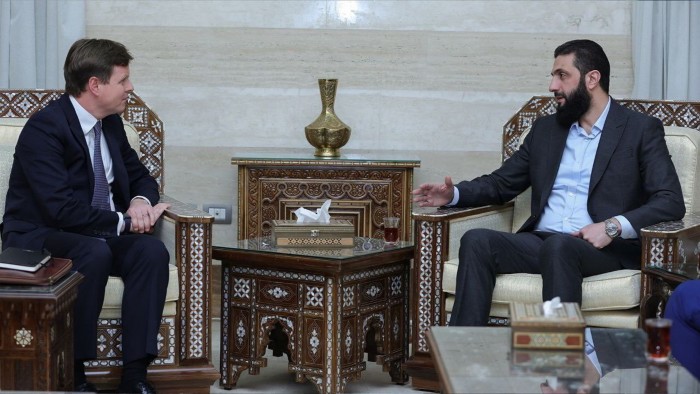Unlock the Editor’s Digest for free
Roula Khalaf, Editor of the FT, selects her favourite stories in this weekly newsletter.
The Syrian rebel groups that ousted Bashar al-Assad are to disband their military wings and form an army, the head of the most powerful faction said, as the new rulers seek to consolidate control over the country.
Abu Mohammed al-Jolani, leader of Hayat Tahrir al-Sham (HTS), said the fighters would join an army that falls under the Ministry of Defence. “We have to adopt a state mentality, not an opposition mentality,” Jolani, who recently began going by his birth name Ahmed al-Sharea, said.
Speaking during a meeting with leaders from the country’s Druze minority, he emphasised the need for a united Syria. “There has to be a social contract between the state and all sects to guarantee social justice,” he said.
The disbanding is a strategic move designed in part to ease restrictions on HTS, an Islamist group once affiliated with al-Qaeda and which remains on US and EU terror lists. Experts say this designation could hurt its plans to reform and rebuild a country devastated by over a decade of war.
Western powers have nonetheless sought to engage with HTS in recent days. Officials from France, Germany and the UK all travelled to Damascus on Monday and Tuesday to meet the country’s new rulers. The US has also had direct contact with HTS.
Turkey and Qatar have also moved to reopen their embassies more than a decade after suspending operations under Assad. Ankara, which has links to HTS, has long been the main backer of the rebels.
Jolani has said Syria is dropping its feared forced conscription and will work on disarming the population to ensure only the official army carries weapons.
Security has been one of the main concerns in the aftermath of the fall of Assad, who had pushed the notion that his regime was the only one that could keep a fragile stability in place and protect minorities.
HTS has an enormous task ahead. While the group had long controlled a small corner of the country, it will need to bolster its capabilities quickly to ensure the security of highways and communities outside major cities.
In a move to address pressing security needs in the capital, the new Ministry of Interior announced on Monday it had opened applications for Damascus’s police department.
Police have had very light presence in Damascus over the past week, with the previous forces disappearing after the fall of Assad’s regime. All police the Financial Times saw on the streets were sent from HTS’s northern stronghold of Idlib, as per the insignia stitched into their uniforms.
Additional reporting by Richard Salame in Beirut
Read the full article here




